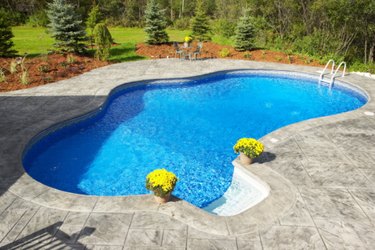
After spending money yet again on chemical chlorine to clean the pool, just about every swimming pool owner has wondered whether common household bleach would do the job just as well. In truth, bleach contains the same base chemical as pool chlorine. That chemical is, of course, chlorine, and the only major difference between the two products is the concentration strength. Pool chlorine typically contains some form of stabilizer, as well, though this is not a crucial factor.
Bleach Versus Pool Chlorine
Video of the Day
Common pool chlorine is made up of the chemical calcium hypochlorite at about 65 percent strength. The calcium hypochlorite form of chlorine is a solid that is easy to introduce into pool water. In addition to the chlorine itself, calcium and other inert ingredients make up the remainder of the chemical. Household bleach is a liquid that contains sodium hypochlorite, which is simply chlorine in its liquid form. Bleach, however, is typically only 5 to 6 percent chlorine. In addition to the chlorine, bleach is mostly composed of water and a very small amount of salt, which is necessary to keep chlorine gas in a liquid state.
Video of the Day
Using Bleach
Using bleach in a pool has its advantages, including convenience. You can simply pour bleach straight from the bottle into the pool's skimmer. Bleach is also inexpensive in comparison to standard pool chlorine. As of 2017, a gallon of bleach can be purchased for $1 when bought in bulk. Pool chlorine is more expensive by comparison. If there's a disadvantage to bleach, it's that it's comparatively weak when matched against pool chlorine. You will need to have more on hand. It takes one gallon of bleach to provide the cleaning power of 3/4 pound of pool chlorine. For a typical 20-foot by 40-foot pool (30,000 gallons), you will need two gallons of bleach to equal the cleaning power of 1.5 pounds of pool chlorine—though it will be considerably cheaper.
Pool Chlorine
Chlorine in the form of Calcium hypochlorite is made specifically for water disinfection purposes, especially in swimming pools. Being formulated specifically for pool use is its primary advantage. Pool chlorine can be introduced into a pool as a powder or in tablet form, which eliminates the problems associated with liquid bleach splashing. Tablets are often slow-release, introducing steady but low amounts of chlorine without the need for regular monitoring. However, calcium hypochlorite can be expensive. As of 2017, a 35-pound bucket typically sells for <ahref="http: www.homedepot.com="" p="" hth-35-lb-chlorinating-tablet-3-in-42005="" 207204676"=""> </ahref="http:>around $100. A 25,000-gallon pool requires 6.5 pounds of calcium hypochlorite to reach 10ppm.
Final Analysis
In the end, determining the type of chlorine disinfectant you'll use in your pool depends on what's most important to you. If controlling cost is important, then bleach can be a bit cheaper to use. One gallon per week in a pool would run you $1, while pool chlorine would run $2.85 per pound. However, if you're more comfortable with the traditional practice of using a product made specifically for pools, then opt for standard calcium hypochlorite pool chlorine.